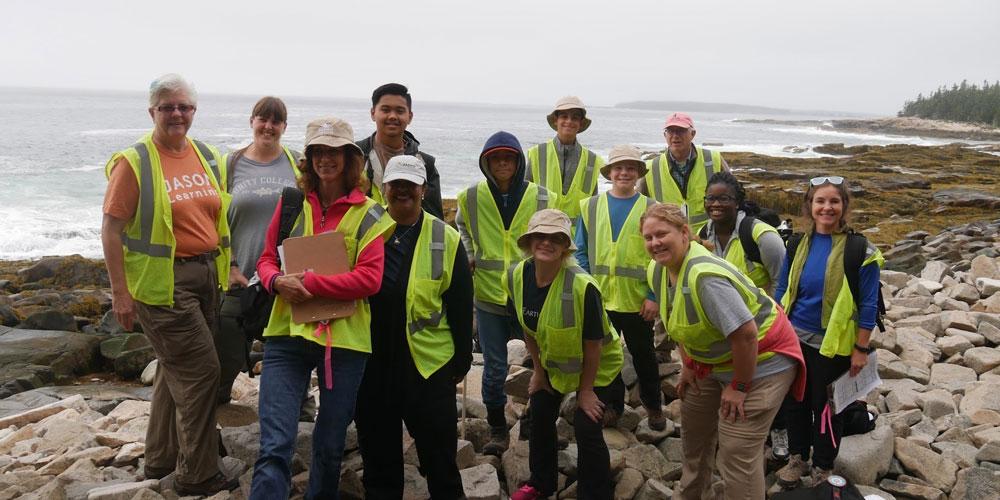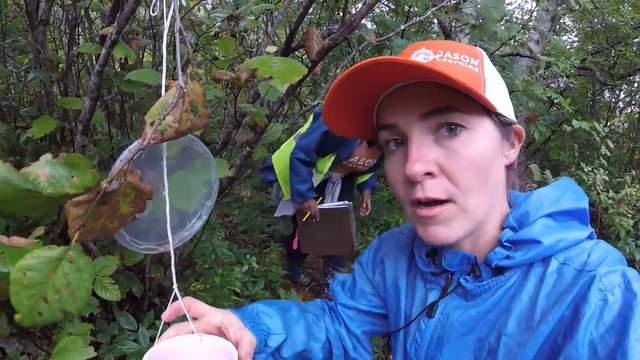Austin Argonauts Study Climate Change in the Field as Citizen Scientists
by Heather Wilson
Originally published on Direct2Dell
Sixth-grade teacher Megan McDonald and 14-year-old student Matthew are all about bug counting.
They can tell you all about why soapy water is best for collecting bugs in a cup – and how to use a microscope and a dichotomous key to identify each of the insects in your sample.
If you’re into looking at bugs – McDonald and Matt are your people.
Bug collecting, berry counting, and green crab catching. These are just some of the skills these “citizen scientists” developed during their five-day research adventure in Acadia National Park, as part of a unique science education program.
McDonald and Matthew – both from Austin, Texas – were selected as JASON National Argonauts and recently joined a group of students, educators and scientists from around the world in a weeklong expedition in the park, located in Maine.
Since 1989, the JASON National Argonaut program has provided hands-on, scientific field work to more than 1,000 students and educators worldwide, many of whom have gone on to pursue degrees and careers in science. The annual Argonaut program trip puts the selected students and educators to work directly with the world’s leading scientists and engineers. Past Argonauts have studied the rainforests in Peru, volcanoes in Hawaii, ecosystems in Florida, and much more.
Dell and JASON work together as part of Dell’s Youth Learning program. The partnership has provided free access to JASON’s STEM (science, technology, engineering, and mathematics) learning materials to students of the Greater Austin Area’s public schools – including digital labs, content and activities, to utilize in the classroom and on their own. Dell’s support also included the sponsorship of two Austin area Argonauts to enter this year’s Argonaut program. McDonald and Matthew were selected for these spots after submitting their personal essays, reference letters and academic records as part of the application process. An enthusiasm for science is key.
A ninth grader from Texas, Matthew has always been drawn to science. His selection as a student Argonaut allowed him to pursue it in ways he never imagined.
“I’ve always liked science – but I had never done anything like this before. I really enjoyed being out in the forest and collecting all the data,” Matthew says. “We looked at eight different species of plants and collected a lot of bugs.”
So why all the bugs and berries?
This year’s Argonauts helped on a project named “Climate Change Seas to Trees,” arranged by Earthwatch at the Schoodic Institute at Acadia National Park. By counting the berries and insects in certain areas of the park, Megan and Matthew and their fellow scientists helped examine if migrating birds will find enough food in order to fuel their journey south for the winter.
Acadia is on a bird “superhighway,” a route heavily traveled by birds that migrate between Canada and South America. Researchers have recorded 23 species of warblers alone here. As Megan learned on her trip, things are changing in Acadia.
“I was surprised to learn that spring is occurring about 17 days earlier than in previous years, and that is expanding the growing season within Acadia National Park by about 66 days,” says Megan. “This has made the park more hospitable to invasive plant species typically adapted for lower latitudes and longer growing seasons. The park has a recorded 500 new insect species previously not seen before!”
Acadia’s scientists have over 120 years of detailed natural history observations to compare to current patterns. Few places in the country have such a rich pool of observations to draw from. The work by Megan and Matthew will help scientists tell the story of how humans are reshaping Acadia. They hope their work will inspire policies to help safeguard this iconic American habitat.
Through her travel blog, McDonald shares more about her Argonaut experience. You can watch her set a bug trap and “push through the willy wags” to carefully inspect what’s crawling on tree branches.
McDonald and Matthew agree, the Acadia Park was a beautiful setting for their adventures – with the Atlantic Ocean sea spray and moss-covered forest. It’s all enough to entice the entire McHorse family back next summer – a vacation Matthew is already planning. His mom, Carol, is proud of her son’s accomplishments.
“This really was a once-in-a-lifetime opportunity for Matthew. Having Dell sponsor him was icing on the cake,” she says. “Matthew has always been our son that wants to know how things work, so for him this really fed his curiosity and love of the outdoors.”
All Argonauts are encouraged to be peer role models for their students and teachers back home. “By working side-by-side with our scientist role models and engaging in real hands-on research, they show how interesting and accessible science can be,” says Patrick Shea, executive vice president of JASON Learning.
Matthew plans to share his experience with his classmates and younger students with a few upcoming presentations. McDonald will share her experience with her sixth-grade students at Kealing Middle School in Austin, by guiding them on a phenology walk as part of the Texas Pollinator BioBlitz.
After studying geography at the University of Texas at Austin, McDonald worked at the Alaska Maritime National Wildlife Refuge. As a teacher, she enjoys showing students how science works in the real world.
“My expedition to Acadia National Park with JASON Learning was an amazing experience! I was able to really reconnect with my passion for field work and the environment – and I’m excited to bring these experiences back to my school community,” says McDonald.
Explore more information on the JASON Learning Argonaut program.
This article shares one example of how Dell is committed to driving human progress by putting our technology and expertise to work where it can do the most good for people and the planet. We call this our Legacy of Good.
Explore our FY17 Annual update on our 2020 Legacy of Good Plan at legacyodgood.dell.com.
Learn more about Dell’s Youth Learning program at dell.com/youthlearning



